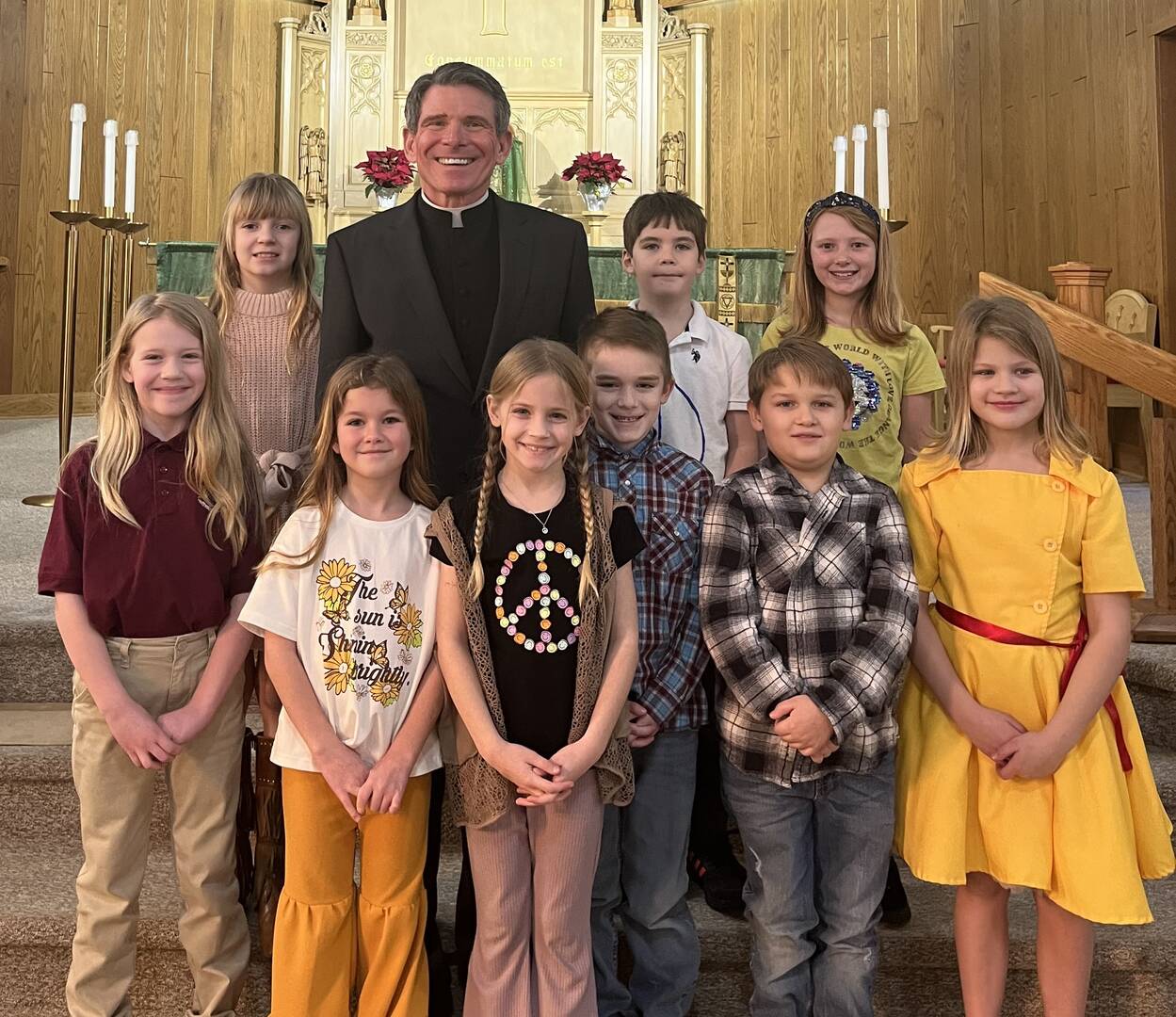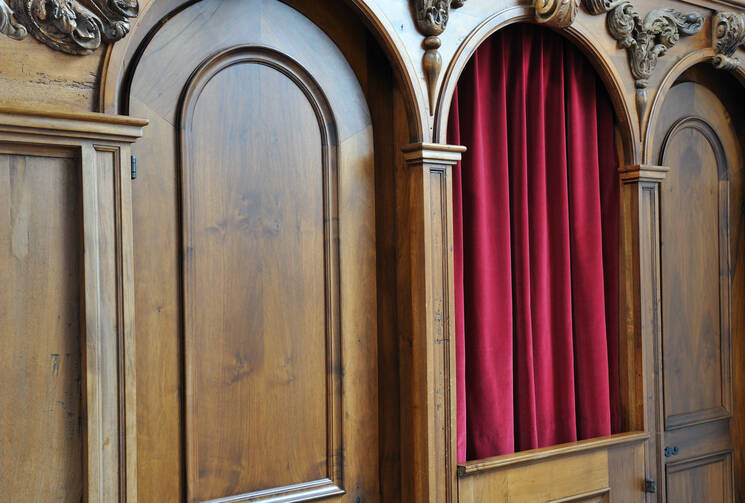A Homily for the Sixth Sunday in Ordinary Time
Readings: Leviticus 13:1-2, 44-46 1 Corinthians 10:31—11: 1 Mark 1:40-45
The Gospel of St. Mark has a “Messianic Secret.” That is the term scholars use when referring to the reluctance of Jesus to be identified as the Messiah, even though everything he does in this Gospel—healing the sick, exorcising demons, feeding the multitude, even raising the dead—reveals Jesus to be the Christ, the promised and long-awaited Messiah of Israel.
Jesus says to the leper whom he cleanses,
See that you tell no one anything,
but go, show yourself to the priest
and offer for your cleansing what Moses prescribed;
that will be proof for them (Mk 1:44).
The command of secrecy is disobeyed. This news is too good to be contained. St. Mark’s point? If the Lord has worked wonders for us as well—to borrow a phrase from an old Quaker hymn—how can we keep from singing?
I need to sing of the Lord’s goodness, what I see happening in the sacrament of penance. It is mercy all the way down, whether I am administering or receiving the sacrament. If you are someone who may have let the wonder wander out of your life, let’s start over. Let’s go back to the beginning.
In preparation for their First Holy Communion, nine of our second-grade students recently celebrated their first confessions. We will leave the “confessional seal” in place. As with adult confessions, I quickly forget what I have heard unless I have promised to pray for someone. All that you need to know about the confessions of second graders is that they have a short memory. Only one sin, maybe two, will be presented, generally things that have just happened.
The priest is supposed to greet penitents and help them to feel at ease. That’s harder to do when the confessions are anonymous, but that’s O.K. If being behind a screen helps, stay behind the screen. We encourage the students to confess face-to-face, at least for their first time.
These first confessions happen during Catholic Schools Week, and today the students are wearing clothes from whatever decade—50s through the 80s—that they have decided to represent. I often begin by complimenting their bell bottoms or their poodle skirts.

Then I say, “Let’s begin with the Sign of the Cross. In the name of the Father and of the Son and of the Holy Spirit. Amen.” They join me in the gesture, and then I add, “And now I’ll say a blessing.” This is supposed to open every confession, and I want them to hear it, to learn about the mercy being sung:
May the Lord, who enlightens every heart,
Help you to know your sins
And to trust in his mercy. Amen.
Telling the priest how long it has been since your last confession is only a diagnostic aid. Precision is not the point. If you say “two years” or “twenty years,” I am listening in a wholly different way than I do when I hear “two weeks.” In this case, I begin with, “We know that this is your first confession. So, what would you like to confess?”
“You mean my sins?”
“Yes, your sins. What have you done wrong.”
This goes quickly with second graders, though the boys tend to be a bit slower than the girls.
Then I say something like this: “Well, just remember that the Lord is with us now for the same reason that he died on that cross. Because he loves you and he wants to forgive you for your sins. And that’s what he does now. He forgives all your sins, even those you can’t remember, because no one can remember all their sins.”
Somehow, many adults believe that sins unconfessed are unforgiven, like groceries, which if they are not scanned are deemed stolen. You are not supposed to withhold a sin that is weighing on your conscience, but no one can remember every sin. We are not scanning every one of your sins.
Remember that confession is a sacrament, which means that we the Church are celebrating and encountering what Jesus has already accomplished through his dying and his rising. Your sins were canceled by Christ when he died on the cross. All sacraments are our way of entering into the salvation Christ has already accomplished, a way he gave to us. As Pope St. Leo the Great put it, “Quod itaque Redemptoris nostri conspicuum fuit in sacramenta transivit” (What our savior has made manifest has passed over into the sacraments.)
God is certainty itself, but human life is always uncertain. In each sacrament, Christ enters our lives and claims them for his own. In them the partialness of human life encounters the completeness of God’s: you are a child of God; be sealed with the Holy Spirit; this is my body; your sins are forgiven, etc. That is why sacraments come to us as gifts. Something is wrong if we see them as burdens.
It is important to note what I do not say, to children or anyone else, in confession. It is not the task of the confessor to make you feel sorry for your sins. You would not be there if you did not already feel contrite. The confessor is not supposed to lecture you. A confessor does not coach and does not insist that you can do better. In general, unless you ask a question or seek advice, he is going to pass over what you have said in silence, speaking instead of God’s mercy.
Nor is the confessor supposed to ask you prurient questions, details that have nothing to do with understanding you.
A parishioner once said to me, “Last month I went to confession in another town. The confessor didn’t say anything to me.”
“He told you that your sins were forgiven. That seems more than enough.”
Then I say to the kids, “Now I am going to give you a penance, something that you can do to show God that you are sorry. Do you know the ‘Our Father’ and the ‘Hail Mary?’ Good. When you go out to the pew, kneel and say those prayers then ask God to bless your family.” Catholic school students know both, but kids in religious education classes might not. I work my way down until I have found something they know, even if it is no more than, “Kneel and ask God to bless your parents.”
A penance does not need “to fit the crime.” Christ did that on the cross. We should all live lives marked by penance, but in confession, the penance should be simple so that the penitent, who might suffer from scruples, knows that it is done. Priests should never give open-ended penances such as “smile at everyone you encounter today” or “think about God’s goodness all day long.” Life has enough neuroses without confessors adding to them.
Then I invite the kids to pray their act of contrition. “That’s the prayer where you tell God that you are sorry.” This is my favorite part, listening to the variants that kids produce. It makes me wonder how I ever learned anything. Here is one variation on the well-known prayer:
Oh my God,
I am hardly sorry for having offended thee,
And I confess all my sins because of thy just punishments
But most of all because they defend you, my God,
Who are all good and worthy of all my love.
I firmly revolve with the help of your grace
To sin some more and to avoid the nearest stations of sin. Amen.
I then extend my hand and say, “Now I’ll say the prayer of forgiveness. Listen carefully.” We should all listen carefully; the whole theology of the sacrament is summed up in a few words.
God the Father of Mercies,
Through the death and resurrection of his Son,
Has reconciled the world to himself
And poured out the Holy Spirit among us for the forgiveness of sins.
Through the ministry of his Church
May he grant you pardon and peace,
And I absolve you from your sins
In the name of the Father, and of the Son, and of the Holy Spirit. Amen.
I then add the acclamation that is supposed to follow, because it perfectly summarizes what has just happened.
“Give thanks to the Lord for he is good.”
“His mercy endures forever.”
“Go in peace.” With the kids, I add a closer: “Good job!”
Leprosy in the ancient world was more than an illness. It could not be cured. It could only be contained. Those who contracted the disease were banished from communal life and excluded from Israel’s worship. They could not approach, much less touch, the uninfected.
Mark’s leper is not a follower of rules. Before he disobeys the command of secrecy, he violates a prohibition about approaching one who is clean. Mark’s Jesus overwrites this rule as well. He reaches out and touches the leper. Why? As St. John Chrysostom put it,
He is not under the hand of the law. The law is in his hands. Hence to the pure in heart, from now on, nothing is impure.
Second-grade students do not yet feel the weight of sin. They have not yet learned to slink away in shame. That is why it is so important for them to learn now that mercy, complete and undoubted, is available when they ask. Just now, the sacrament is a bit gratuitous for them, meaning that it lacks sufficient cause. Later under the reign of shame—the great deception of the Evil One—it will still be gratuitous, meaning that the grace given is free for the asking.








